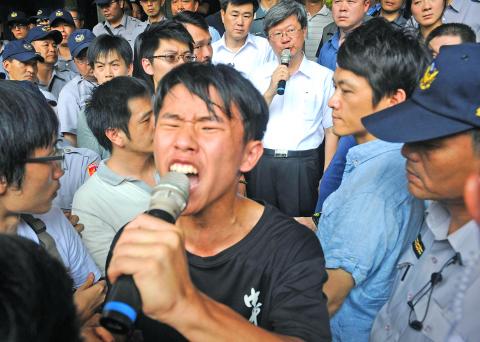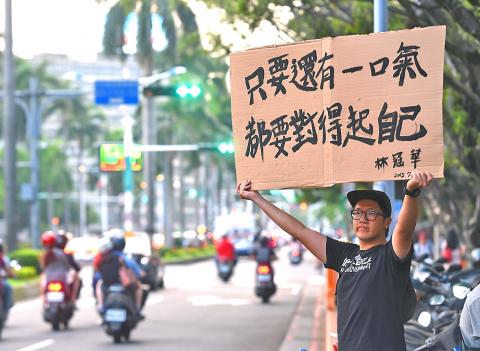Talks between student activists and Minister of Education Wu Se-hwa (吳思華) broke down yesterday, after Wu refused to agree to withdraw controversial adjustments to high-school curriculum guidelines and step down.
“We never would have guessed that there would be a minister of education who cannot even answer an elementary true-or-false question,” student leader Liao Chung-lun (廖崇倫) of Taichung First Senior High School said. “He isn’t able to tell us whether curriculum guidelines will be withdrawn — he is only able to thank us for our opinions, a phrase we are fed up with hearing.”
The “fine-tuned” guidelines’ allegedly “China-centric” focus has sparked waves of student protests.

Photo: CNA
Wu appeared at the Ministry of Education building’s entrance early in the afternoon, advancing through ranks of police officers. He called for a moment of silence for student activist Dai Lin (林冠華) before falling back behind police officers to address the crowd gathered in the ministry’s outer courtyard.
Lin’s suicide on Thursday was the catalyst behind the latest wave of protests, which led to the courtyard’s occupation during the middle of the following night.
Wu yesterday said that drafting curriculum guidelines was a question that required “expertise,” urging students to hold further talks with the ministry.

Photo: Fang Pin-chao, Taipei Times
“Curriculum guidelines are the future of students and young people — let us do something that we will not regret in 20 years,” he said, adding that only through dialogue could societal “harmony” and “peace” be achieved.
Wu’s comments were repeatedly interrupted with shouts of “withdraw or not,” with members of the crowd raising fists and fingers at Wu, demanding that he limit his remarks to the question of whether the curriculum guidelines would be withdrawn.
“Many societal questions cannot be answered with just checks-and-crosses,” Wu said. “Curriculum guidelines are one of those questions that are not black-and-white.”
Liao declared that negotiations had broken down because Wu had failed to agree to withdraw the guidelines, with the crowd erupting in chants for the minister to “leave” and “resign.”
Yesterday’s confrontation represented the first formal discussions between Wu and the student activists since a ministry-sponsored forum last month.
Activists’ confrontation of Wu during a forum on the guidelines led to the delay of further forums until the past two weeks, while ministry officials insisted that Wu would meet only with student representatives.
Deputy Minister of Education Lucia Lin (林思伶) and Ministry of Education Secretary-General Wang Chun-chuan (王俊權) had addressed students in the morning prior to Wu’s afternoon appearance, telling students to select representatives to meet with ministry officials to set up a later meeting with Wu, whose schedule they said prevented him from addressing the students.
They were quickly shouted down by the crowd, who demanded that Wu “come out and face the music,” rejecting the ministry’s offer of a private meeting as “a pat on the head.”
Yesterday’s confrontation came after student activists occupied the outer courtyard of the ministry early in the morning, after Wu failed to resign following Lin’s suicide.
A student-led crowd pushed down the iron barricades around the ministry, using quilts and cardboard boxes to cover the razor wire and climb into the complex.
As activists streamed into the ministry’s outer courtyard, the police retreated to protect the entrance to the building.
“Now the minister does not have to work so hard and cast lots before being able to meet with students — the people have come looking for the minister,” Restoration of Taiwan Social Justice convener Lin Yu-lun (林于倫) said.
After Lin’s suicide on Thursday, a crowd of about 100 protesters gathered outside the ministry gates, lighting candles and pasting posters on the barricades wishing Wu “sweet dreams.”
At about 10 pm, the crowd suddenly charged to the nearby Legislative Yuan building next door, with some members briefly occupying its courtyard. Students from the Northern Taiwan Anti-Curriculum Changes Alliances were first observed blocking the courtyard entrance, quickly directing the crowd back to the Ministry Education building after police reinforcements arrived.
Yang Shang-en (楊尚恩) of the activist group Dreamdom (夢由藝文工作室) — which he said was responsible for planning the protest — said that the move on the Legislative Yuan was a temporary measure meant to put pressure on the Chinese Nationalist Party (KMT) caucus to convene an emergency session to force the withdrawal of the curriculum guidelines.
Back at the ministry gates, alliance members burned “ghost money” and pictures of Wu as a symbolic sacrifice to Lin’s spirit.
They then sang "Happy Birthday" while holding white roses, saying that they would “keep Lin company” outside the gates until midnight.
Thursday was Lin’s 20th birthday, and he said in a final Facebook post that the withdrawal of the guidelines was his only birthday wish.
Democratic Progressive Party caucus whip Ker Chien-ming (柯建銘) made an appearance next to the fire, promising to call on Legislative Speaker Wang Jin-pyng (王金平) to hold consultations on forcing Wu’s resignation and the withdrawal of the guidelines.
Shouts of “Wu, go to hell” and “curriculum guidelines go to hell” quickly erupted as activists threw “ghost money” into the air.
As news of the protest spread, the crowd outside ministry gates swelled, with activists demanding that Wu submit his resignation by 1am.
They pushed down the ministry’s barricades and occupied its outer courtyard after the deadline passed.
Student activists on Thursday had confronted Wu outside of Lin’s home, yelling for the “minister murderer” (殺人部長) to resign.
Alliance spokesman Brian Sung (宋運川) said the group had decided to initiate the protest after returning from a ministry-sponsored forum on the guidelines at National Wu-Ling Senior High School where disrespectful comments about Lin been made by a member of the pro-unification Patriot Association.
The protesters’ actions were fueled both by grief for Lin and by frustration over the ministry’s refusal to withdraw the guidelines and initiate meaningful dialogue, he said, while refusing to comment on the role of Dreamdom.
“[Ministry officials] turned our earnestness and hard work into a game,” Northern Taiwan Anti-Curriculum Changes Alliance spokesman Wang Pin-chen (王品蓁) said.
While students demanded that the curriculum guidelines be withdrawn, ministry officials in forums yesterday only promised that students who won a “lottery” would be able to talk with Wu, she said.
Activists had repeatedly demanded that Wu meet with all students publicly, rather than arranging a private meeting.
“While the ministry says that they sincerely want to communicate with us, they have absolutely no idea what our demands are,” said Chung Hsin-ting (鐘欣庭), a sophomore at The Affiliated Senior High School of National Taiwan Normal University.
She said the deputy director of the K-12 Education Administration had to consult his cellphone at the Wu-Ling forum when she asked him to repeat protesters’ demands.
At press time yesterday, a crowd of 700 outside the ministry building had swelled following a mid-day lull. An impromptu forum square had been established outside ministry doors, with activists delivering non-stop speeches.
Impromptu tents had been erected throughout the ministry’s courtyard, while banners and posters were plastered over the ministry building and the remaining barricades.

Tropical Storm Gaemi strengthened into a typhoon at 2pm yesterday, and could make landfall in Yilan County tomorrow, the Central Weather Administration (CWA) said yesterday. The agency was scheduled to issue a sea warning at 11:30pm yesterday, and could issue a land warning later today. Gaemi was moving north-northwest at 4kph, carrying maximum sustained winds near its center of up to 118.8kph and gusts of 154.8kph. The circumference is forecast to reach eastern Taiwan tomorrow morning, with the center making landfall in Yilan County later that night before departing from the north coast, CWA weather forecaster Kuan Shin-ping (官欣平) said yesterday. Uncertainty remains and

SEA WARNING LIKELY: The storm, named Gaemi, could become a moderate typhoon on Wednesday or Thursday, with the Taipei City Government preparing for flooding A tropical depression east of the Philippines developed into a tropical storm named Gaemi at 2pm yesterday, and was moving toward eastern Taiwan, the Central Weather Administration (CWA) said. Gaemi could begin to affect Taiwan proper on Tuesday, lasting until Friday, and could develop into a moderate typhoon on Wednesday or Thursday, it said. A sea warning for Gaemi could be issued as early as Tuesday morning, it added. Gaemi, the third tropical storm in the Pacific Ocean this typhoon season, is projected to begin moving northwest today, and be closest to Taiwan on Wednesday or Thursday, the agency said. Today, there would likely

DISRUPTIONS: The high-speed rail is to operate as normal, while several airlines either canceled flights or announced early departures or late arrivals Schools and offices in 15 cities and counties are to be closed today due to Typhoon Gaemi, local governments announced last night. The 15 are: Taipei, New Taipei City, Taoyuan, Tainan, Keelung, Hsinchu and Kaohsiung, as well as Yilan, Hualien, Hsinchu, Miaoli, Chiayi, Pingtung, Penghu and Lienchiang counties. People should brace for torrential rainfall brought by the storm, with its center forecast to make landfall on the east coast between tonight and tomorrow morning, the Central Weather Administration (CWA) said. The agency issued a sea warning for the typhoon at 11:30pm on Monday, followed by a land warning at 11:30am yesterday. As of

CASUALTY: A 70-year-old woman was killed by a falling tree in Kaohsiung as the premier warned all government agencies to remain on high alert for the next 24 hours Schools and offices nationwide are to be closed for a second day today as Typhoon Gaemi crosses over the nation, bringing torrential rain and whipping winds. Gaemi was forecast to make landfall late last night. From Tuesday night, its outer band brought substantial rainfall and strong winds to the nation. As of 6:15pm last night, the typhoon’s center was 20km southeast of Hualien County, Central Weather Administration (CWA) data showed. It was moving at 19kph and had a radius of 250km. As of 3pm yesterday, one woman had died, while 58 people were injured, the Central Emergency Operation Center said. The 70-year-old